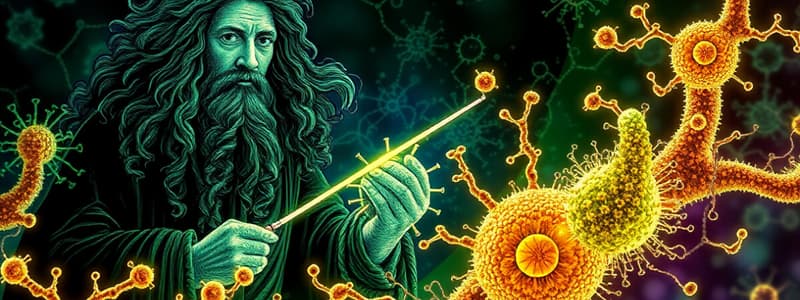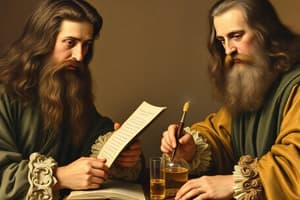Podcast
Questions and Answers
Who was the first individual to describe microbes in detail?
Who was the first individual to describe microbes in detail?
- Anton van Leeuwenhoek (correct)
- Robert Hooke
- Ferdinand Julius Cohn
- Louis Pasteur
Which significant contribution to microbiology occurred in 1964?
Which significant contribution to microbiology occurred in 1964?
- Introduction of the first microscope
- Observation of bacterial movement
- Description of fruiting structures of molds (correct)
- Discovery of penicillin
What was Ferdinand Julius Cohn primarily known for?
What was Ferdinand Julius Cohn primarily known for?
- Examining eukaryotic microorganisms and bacteria (correct)
- Publishing a book on plant biology
- Developing vaccines
- Inventing the microscope
Which of the following individuals was a skilled lens maker and contributed to the study of microbes?
Which of the following individuals was a skilled lens maker and contributed to the study of microbes?
What year is associated with Robert Hooke's significant contribution to microbiology?
What year is associated with Robert Hooke's significant contribution to microbiology?
Flashcards
Who was Ferdinand Julius Cohn?
Who was Ferdinand Julius Cohn?
Ferdinand Julius Cohn was a German botanist and pioneer in the field of microbiology. He is known for his meticulous examination of the microbial world, making significant observations of bacteria and eukaryotic microorganisms.
Who was Robert Hooke and what was his contribution to microbiology?
Who was Robert Hooke and what was his contribution to microbiology?
Robert Hooke was an English scientist who used a microscope to observe the fruiting structures of molds in 1664. This was a significant discovery that laid the foundation for the study of fungi.
What was Anton van Leeuwenhoek's contribution to microbiology?
What was Anton van Leeuwenhoek's contribution to microbiology?
Anton van Leeuwenhoek, a Dutch tradesman and skilled lens maker, was the first to describe microbes in detail in 1673. He used his highly refined microscopes to observe and document the presence of microorganisms, which were previously unknown.
What is microbiology?
What is microbiology?
Signup and view all the flashcards
How did early advances contribute to the development of microbiology?
How did early advances contribute to the development of microbiology?
Signup and view all the flashcards
Study Notes
Early Microbiology Pioneers
- Robert Hooke first used a microscope to describe the fruiting structures of molds in 1664.
- Anton van Leeuwenhoek, a Dutch tradesman and skilled lens maker, first described microbes in detail in 1673.
- Ferdinand Julius Cohn meticulously examined microbes, making detailed observations of eukaryotic microorganisms and bacteria.
Studying That Suits You
Use AI to generate personalized quizzes and flashcards to suit your learning preferences.




